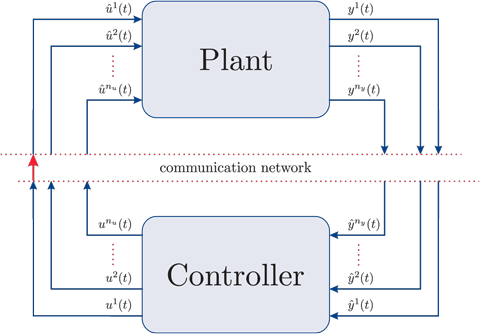Wide NCST
Contents |
Overview
This toolbox models, analyzes and synthesizes networked control systems (NCSs) where a linear time invariant system (referred to as a plant) is connected to a controller over a network, as depicted in Fig. 1 below.
There are two modeling frameworks taken in this toolbox, the discretized NCS model and the hybrid NCS model. At this developmental stage in the toolbox, each modeling approach differs in the network effects included in the models.
In the discretized NCS framework, stability analysis and synthesis of state feedback controllers is considered with the network including the following effects:
- transmission intervals
![h_k \in [\underline{h}, \overline{h}]](/HYCON2/images/math/8/4/d/84dfa3af6060ce91262d8e52d906632e.png)
- varying delays
![\tau_k \in [\underline{\tau}, \overline{\tau}]](/HYCON2/images/math/e/8/a/e8ad64923472b0687a9cc3e80c0b19db.png) (small delay
(small delay  )
)
- varying dropouts

- shared communication medium: only a subset of input and a subset of output signals are transmitted simultaneously
Due to the fact that the parameters vary in an infinite set, the discretized NCS approach requires to transform the system into a polytopic system which captures the dynamics of the original discretized NCS. Three methods of transformation into a polytopic set are implemented in this toolbox: the Jordan Normal Form overapproximation, the Cayley-Hamilton overapproximation and the Gridding and Norm Bounding overapproximation. Stability and synthesis can be preformed on the polytopic system representation using linear matrix inequality (LMI) techniques.
In the hybrid framework, stability analysis of dynamic controllers is considered with the network including the following effects:
- transmission intervals
![h_k \in [\underline{h}, \overline{h}]](/HYCON2/images/math/8/4/d/84dfa3af6060ce91262d8e52d906632e.png)
- varying delays
![\tau_k \in [\underline{\tau}, \overline{\tau}]](/HYCON2/images/math/e/8/a/e8ad64923472b0687a9cc3e80c0b19db.png) (small delay
(small delay  )
)
- shared communication medium: only a subset of input and a subset of output signals are transmitted simultaneously.
The hybrid approach has the advantage that a polytopic overapproximation is not needed and stability can be performed directly on the original model of the networked control system. This Lyapunov function has a special form suitable for the NCS dynamics.
Author Information
This toolbox was developed by the Hybrid and Networked Systems group at the Eindhoven University of Technology.
Further Reading
Hybrid NCS Framework
- Bauer, N.W., Maas, P.J.H. and Heemels, W.P.M.H. Stability analysis of networked control systems : a sum of squares approach, Proceedings of the 49th IEEE Conference on Decision and Control, pages 2384-2389, December 2010.
- W.P.M.H. Heemels, A.R. Teel, N. van de Wouw, and D. Nesic. Networked Control Systems With Communication Constraints: Tradeoffs Between Transmission Intervals, Delays and Performance. IEEE Transactions on Automatic Control, 55(8):1781-1796, August 2010.
Discretized NCS Framework
- M.B.G. Cloosterman, N. van de Wouw, W.P.M.H. Heemels, and H. Nijmeijer. Stability of Networked Control Systems With Uncertain Time-Varying Delays. IEEE Transactions on Automatic Control, 54(7):1575-1580, July 2009.
- M.B.G. Cloosterman, L. Hetel, N. van de Wouw, W.P.M.H. Heemels, J. Daafouz and H. Nijmeijer. Controller synthesis for networked control systems. Automatica, 46(10):1584-1594, 2010.
- M.C.F. Donkers, W.P.M.H. Heemels, N. van de Wouw, and L. Hetel. Stability Analysis of Networked Control Systems using a Switched Linear Systems Approach. IEEE Transactions on Automatic Control, 56(9):2101-2115, Sept 2011.
- W.P.M.H. Heemels, N. van de Wouw, R.H. Gielen, M.C.F. Donkers, L. Hetel, S. Olaru, M. Lazar, J. Daafouz, and S. Niculescu. Comparison of overapproximation methods for stability analysis of networked control systems. HSCC '10: Proceedings of the 13th ACM international conference on Hybrid systems: computation and control, pages 181-190, New York, NY, USA, 2010. ACM.
- J.J.C. van Schendel, M.C.F. Donkers, W.P.M.H. Heemels, and N. van de Wouw. On dropout modelling for stability analysis of networked control systems. Proceedings of the American Control Conference, pages 555-561, July 2010.
